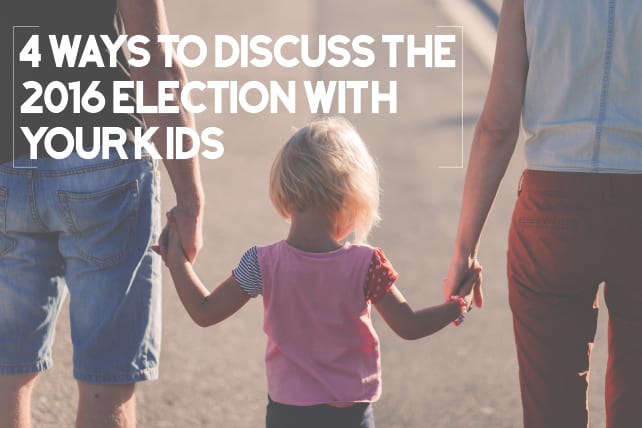Several years ago, I quipped before an audience, “Election years make people crazy.” And that was before I had any idea what was coming in 2016.
For families with children, this election year brings unique challenges, since the campaign often feels like a reality show. How do we talk to our kids about what they are seeing and hearing all around them?
Here are a few things we do.
1. Combat fear.
This is the most important step. It’s true in any election year, due to the way partisans—and sadly, especially Christians—speak in apocalyptic terms. “If Barack Obama is elected, we won’t have a country left in four years,” many bemoaned in 2008. Four years earlier, others insisted, “Our country can’t survive the reelection of George W. Bush.”
Elections have consequences, yes. Elections are important, yes. But elections are not the pinnacle of history—for either good or for bad.
Our children should see that we’re concerned about our country, but that we’re not wringing our hands over the election. As Christians, we have an Apocalypse revealed to us. This isn’t it.
2. Avoid tribalism.
Many Americans see political candidates in the same way as their sports teams. They revel in the glory of the winners and despair with the losers. My side is all-good; your side is stupid and evil. If you have a candidate in this year’s election, explain to your children why you support them. But also explain why others would support another candidate, and be as fair as possible to their views.
Another way to do this is to show where you disagree with your candidate. This will be important, even if he or she is a write-in candidate of your choosing. If you agree with a political party or political movement 100 percent, you probably haven’t found a party platform, but a new biblical canon. You want your children to see that your conscience is dictated by something (or, rather, someone) more than the pull of whatever mob has the right bumper stickers.
Beyond that, model what it means to glean news from multiple sources. Don’t simply listen to the reassuring voices of whatever media outlet says your candidate will win.
3. Educate about the issues.
Talk to your children not just about issues raised in the debates and television ads, but also about issues that aren’t raised at all. Ask why candidates might not want to talk about some pressing questions. That will teach your children not just about citizenship, but about human nature. Don’t just talk about issues your child knows immediately affect you. Look at how public decisions affect those without much power—the unborn, the immigrant, the indebted, the elderly, the refugee.
4. Keep the gospel the gospel.
Show your children what matters most to you—which should be the kingship of Jesus that is not of this world. When you see politicians discuss faith used cynically, point it out to your children. There will come a day when your children will wonder whether the gospel is just a cover for some cultural or political agenda.
Make sure they grasp that the gospel has social and political implications, but that politics is not the gospel.
Moreover, make sure they see that you aren’t enmeshed psychologically with your candidate or your party. You’re united to Christ Jesus, and you don’t need some other would-be messiah. Sometimes that means after you’ve talked about the blessings of living in a democratic republic, after you’ve discussed the implications of the election on various issues, you smile and shrug and say, “But it’s only the presidency.”
Your children should see that while you respect the office of President, it isn’t ultimate. They should see that your greatest hope for one of them isn’t that he or she would be President of the United States. It’s that he or she would be a ruler of the universe as a joint-heir of Christ Jesus, sharing in his inheritance, reconciled by the blood of his cross.












